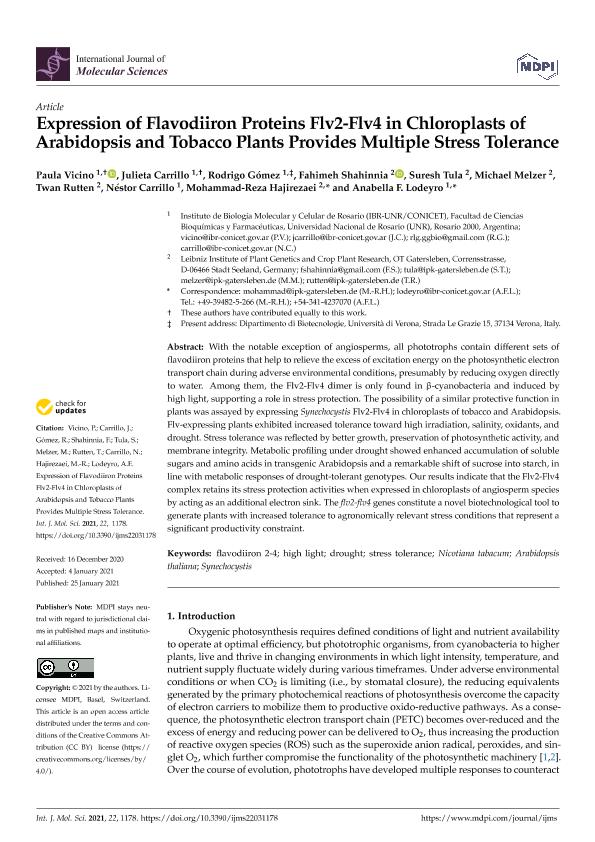Artículo
Expression of Flavodiiron Proteins Flv2-Flv4 in Chloroplasts of Arabidopsis and Tobacco Plants Provides Multiple Stress Tolerance
Vicino, Paula ; Carrillo, Julieta Beatriz
; Carrillo, Julieta Beatriz ; Gomez, Rodrigo Lionel
; Gomez, Rodrigo Lionel ; Shahinnia, Fahimeh; Tula, Suresh; Melzer, Michael; Rutten, Twan; Carrillo, Nestor Jose
; Shahinnia, Fahimeh; Tula, Suresh; Melzer, Michael; Rutten, Twan; Carrillo, Nestor Jose ; Hajirezaei, Mohammad Reza; Lodeyro, Anabella Fernanda
; Hajirezaei, Mohammad Reza; Lodeyro, Anabella Fernanda
 ; Carrillo, Julieta Beatriz
; Carrillo, Julieta Beatriz ; Gomez, Rodrigo Lionel
; Gomez, Rodrigo Lionel ; Shahinnia, Fahimeh; Tula, Suresh; Melzer, Michael; Rutten, Twan; Carrillo, Nestor Jose
; Shahinnia, Fahimeh; Tula, Suresh; Melzer, Michael; Rutten, Twan; Carrillo, Nestor Jose ; Hajirezaei, Mohammad Reza; Lodeyro, Anabella Fernanda
; Hajirezaei, Mohammad Reza; Lodeyro, Anabella Fernanda
Fecha de publicación:
02/2021
Editorial:
MDPI AG
Revista:
International Journal of Molecular Sciences
ISSN:
1422-0067
Idioma:
Inglés
Tipo de recurso:
Artículo publicado
Clasificación temática:
Resumen
With the notable exception of angiosperms, all phototrophs contain different sets of flavodiiron proteins that help to relieve the excess of excitation energy on the photosynthetic electron transport chain during adverse environmental conditions, presumably by reducing oxygen directly to water. Among them, the Flv2-Flv4 dimer is only found in β-cyanobacteria and induced by high light, supporting a role in stress protection. The possibility of a similar protective function in plants was assayed by expressing Synechocystis Flv2-Flv4 in chloroplasts of tobacco and Arabidopsis. Flv-expressing plants exhibited increased tolerance toward high irradiation, salinity, oxidants, and drought. Stress tolerance was reflected by better growth, preservation of photosynthetic activity, and membrane integrity. Metabolic profiling under drought showed enhanced accumulation of soluble sugars and amino acids in transgenic Arabidopsis and a remarkable shift of sucrose into starch, in line with metabolic responses of drought-tolerant genotypes. Our results indicate that the Flv2-Flv4 complex retains its stress protection activities when expressed in chloroplasts of angiosperm species by acting as an additional electron sink. The flv2-flv4 genes constitute a novel biotechnological tool to generate plants with increased tolerance to agronomically relevant stress conditions that represent a significant productivity constraint.
Archivos asociados
Licencia
Identificadores
Colecciones
Articulos(IBR)
Articulos de INST.DE BIOLOGIA MOLECULAR Y CELULAR DE ROSARIO
Articulos de INST.DE BIOLOGIA MOLECULAR Y CELULAR DE ROSARIO
Citación
Vicino, Paula; Carrillo, Julieta Beatriz; Gomez, Rodrigo Lionel; Shahinnia, Fahimeh; Tula, Suresh; et al.; Expression of Flavodiiron Proteins Flv2-Flv4 in Chloroplasts of Arabidopsis and Tobacco Plants Provides Multiple Stress Tolerance; MDPI AG; International Journal of Molecular Sciences; 22; 3; 2-2021; 1-21
Compartir
Altmétricas



